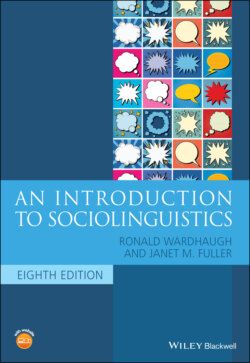Читать книгу An Introduction to Sociolinguistics - Ronald Wardhaugh, Janet M. Fuller - Страница 76
The standard language ideology
ОглавлениеThe standard language ideology revolves around the belief that a particular variety of a given language (the standardized variety) is superior to other related varieties (which are often labeled as ‘dialects,’ as discussed in chapter 2). Inherent in this ideology is the belief that languages are internally homogeneous, bounded systems. The concept of hegemony is important here; hegemonic ideologies are dominant ideologies which achieve their dominance in society through broad consensus and acceptance of them as some sort of ‘truth.’ Although as linguists we know that there is nothing linguistically superior about the standard, belief in its superiority is so widespread that many people will come up with arguments about why certain nonstandard features of language are linguistically inferior (i.e., ‘lazy’ or ‘illogical’). Here, even those who are disadvantaged by these ideologies believe in them – thus it is not uncommon for speakers of nonstandard varieties to consider their own language deficient because they have accepted the standardized language ideology as ‘truth.’ Lippi‐Green (2012) exemplifies and refutes the standard language ideology in a chapter titled ‘The Real Trouble with Black English,’ saying that although criticisms of AAVE are often made on the basis of linguistic inferiority, linguistic analyses have shown that AAVE is a rule‐governed, systematic language with every bit as much sophistication as any other variety of English. What bothers speakers of Standard English is that they feel that continued use of AAVE is a rejection of mainstream – often perceived as White – middle‐class values.
The standard language ideology can also be used to discriminate against ‘non‐native’ speakers of a language; the main principle is the same, that one way of speaking is inherently better than all others, but in this case the ways of speaking are linked to being a learner or second language speaker of a language. Lindemann and Moran (2017) discuss the use of the term ‘broken English’ in the US context. A major finding of their study is that this term is used to construct the ‘other’ in US society and is often used as a descriptor for people who are described negatively in other ways (e.g., criminals). In the cases in which ‘broken English’ is assigned to a person of high social status, it is used to portray their high status as problematic or perhaps undeserved.
